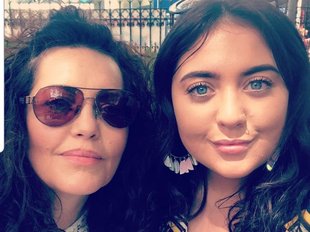Nicola Butler: "I didn't want to worry them so I kept the chance it could be cancer to myself"

Nicola and her daughter Paige
Nicola was 46 years old when she was diagnosed with stage 1c epithelial germ cell ovarian cancer. In 2023, Nicola marked five years since her treatment ended and her final appointment with her consultant (before she moves under the care of her GP with annual blood tests). Here she reflects on the importance of listening to your body.
"In January 2017 I started to become very tired. I could just about manage a day’s work and instead of going to my usual gym classes I would just go home and go to bed. I was sleeping so much. Around February and March, I started to get a clear discharge and missed a period. I googled the causes and I thought it was likely to be my age, as I was pre-menopausal. I’d started experiencing a consistent dull ache, like period pain, and my period was late again, so I went to see my GP to see what could be the cause and why I was so tired.
Various blood tests were taken and nothing really changed so she arranged for me to have an ultrasound scan. Before that appointment came I suddenly had pain in my back and tummy so I went made an emergency GP appointment. It was that doctor who I believe saved my life. She ordered me the CA125 blood test. She said she didn't think it was cancer but better to check.
"I still struggle with what I've been through but I've been told it is okay to feel this way"
The next week she called me to tell me my levels were raised - not overly high but raised none the less. Within two weeks I had an appointment for a transvaginal ultrasound. That's when my life changed. A large complex cyst was identified on my right ovary. The consultant arranged a CT scan and then came the news – you can have your operation the day after next. In a whirlwind I signed the papers for the operation, spoke to my surgeon and met the after-care nurse. I hadn't even told my children or family.
I went home and told them. I didn't want to worry them so I kept the chance it could be cancer to myself. Two days later I had my surgery – a total hysterectomy. It was hard but I was relieved it was done. Three weeks later I went to see my surgeon who told me it was a stage 1c. Had my tube not collapsed when she opened me it would have been stage 1a. She recommended I have chemo. Belts and braces, she said. In October I started six rounds of carboplatin. I had my last treatment in January 2018 and a clear CT scan at the end of it.
A week later I was back in work. For me, going back to work meant a step to getting back to normality. I still struggle with what I've been through but I've been told it is okay to feel this way. I worry about aches and pains but I remind myself I had aches and pains before all this!
I want other women to listen to their bodies and know when it's telling you. My body was screaming at me, saying hey – something’s not right. I listened and I was persistent with my GP, which meant I had an early diagnosis.
As I head to this important five year mark, I hope that by reading my story it gives someone else (who is where I was five years ago) hope, strength and positivity to get through it because there are good news stories."
The earlier ovarian cancer is detected, the better chance a woman has of survival. Professor Ahmed Ahmed and his team are working to better understand ovarian cancer in order to develop the world’s first ovarian cancer screening tool.
Your support can help us reach a world where ovarian cancer is a survivable disease for all women.